The Bank of England is to impose a series of tests on large UK banks to establish whether they are able to withstand a dramatic slowdown in China, a contraction in the eurozone, the worst deflation since the 1930s or a fall in UK interest rates to zero.
The Co-operative bank – which failed last year’s tests – is no longer included in the annual assessments of the industry’s financial strength as it is too small, leaving six banks and the Nationwide building society to be tested.
The banks are Barclays, HSBC, Santander UK, Standard Chartered and the two bailed-out banks, Lloyds Banking Group and Royal Bank of Scotland.
The Bank will give more weight to international scenarios, devised after talks with the International Monetary Fund, than it did in the 2014 tests, which had a domestic emphasis. Last year’s tests were designed to meet those imposed by the European Banking Authority, which is not conducting tests this year.
The City is expecting this year’s tests to focus on the strength of HSBC and Standard Chartered, although a scenario for the UK is included, under which inflation is negative for seven consecutive quarters – the largest fall in prices for 80 years – and the bank rate cut to zero from the 0.5% level at which it has been stuck since the banking crisis.
Banks are being asked to test their ability to withstand shocks over a five-year period to the end of 2019 and be expected to maintain a minimum amount of capital and meet a leverage ratio – a tougher measure of financial strength – while ensuring lending to the real economy grows 10% over the five-year period.
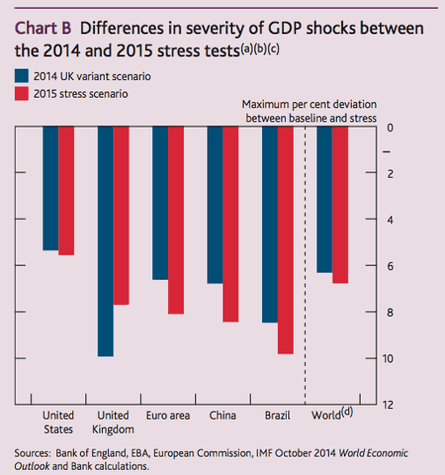
Mark Carney, governor of the Bank, said last year’s results showed the UK banking system was stronger than it had been before the 2008 crisis. “This year’s test will have a different focus and is equally important. By assessing the resilience of the UK banking system against a major shock, we will improve further our ability to identify vulnerabilities and we will ensure that banks have plans in place to address a wider range of problems,” Carney said.
The severity of the test’s imagined downturn in China – with growth falling to about 1.6% growth – is likened to the scale of the fall in house prices in the UK used last year, when house prices were assumed to collapse by 35%. Chinese economic growth is about 7%.
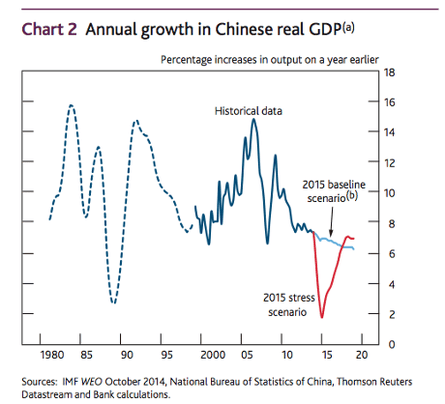
Under such scenarios, the eurozone GDP troughs at -2.1% in the first quarter of 2016, while the UK economy would contract by 2.3% in 2015 before recovering. Oil prices would fall to $38 a barrel and other commodity prices would also be weak. A tougher test is being imposed on the investment banking arms of banks to assess their ability to cope with a seizure in the financial markets and the event of their biggest clients – be they rival banks or major companies – defaulting.
The Bank said the Co-op had been left out because it had no plans to increase the size of its balance sheet, which has been scaled back from the height of its problems in 2013, when a £1.5bn capital shortfall was uncovered and hedge funds stepped in to bail it out. “It’s significantly smaller than the other banks included in the 2015 stress test. So the resilience of Co-operative Bank is unlikely, on its own, to have a material impact on the resiliences of the financial system,” the Bank said.
The test for world GDP is more severe than the risks estimated by the IMF, which said in October that there was a one in 20 chance of global growth below 2.5% in 2015. The Bank is asking banks to factor in world GDP falling to 0.9% in 2015 – after contracting for a period of the year – and 0.7% in 2016. Even so, the contraction in economic activity across the world’s biggest economies is less than that experienced amid the recent global financial crisis although such cumulative falls have not taken place since the second world war.
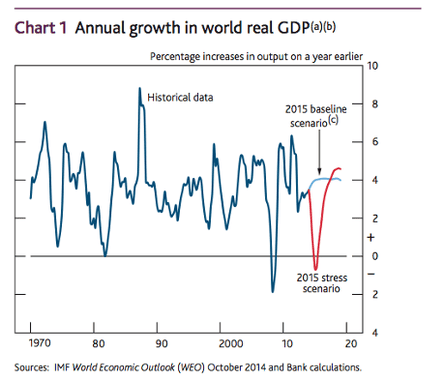
There is no assumption in the tests that Greece will pull out of the eurozone. “As a forward-looking regulator our job is never complete,” said Carney. “Our focus is clear. To promote the good of the people of the United Kingdom, we are committed to ensuring that our major banks are resilient, that they can weather shocks without calling on taxpayer support, and that they can continue to lend even in adverse conditions.”
Threadneedle Street has pointed out that these estimates are not forecasts but scenarios intended to put banks under pressure.
The banks being tested account for 70% of the stock of lending to UK businesses and about 75% of the stock of UK mortgage lending.
Banks will need to have a capital ratio of 4.5% and meet a leverage ratio of 3% to pass the test. The Prudential Regulation Authority (PRA) could require banks to strengthen their capital position by raising new funds or selling off businesses.
But, even if banks meet the hurdle rates, the PRA could still demand action if it is concerned. It could impose new capital requirements across the sector.
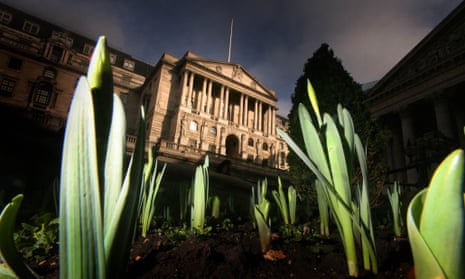
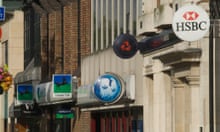

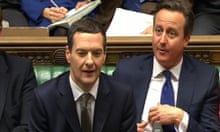





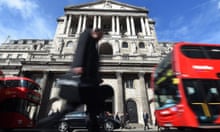
Comments (…)
Sign in or create your Guardian account to join the discussion